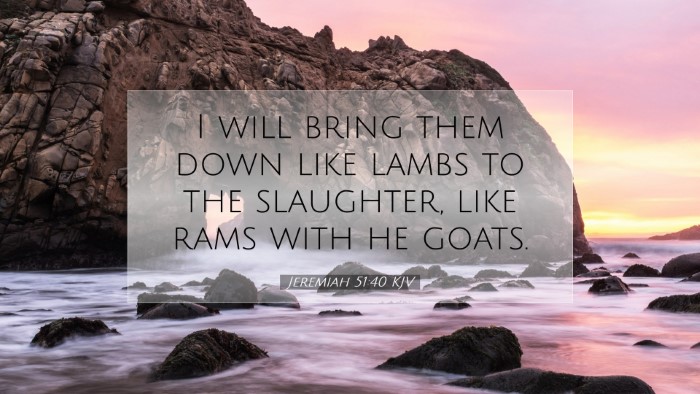Commentary on Jeremiah 51:40
Verse Context: Jeremiah 51:40 states, "I will bring them down like lambs to the slaughter, like rams with male goats." This verse is embedded within a larger prophetic message concerning the impending judgment of Babylon, symbolizing the comprehensive fall of this once-great empire.
Overview of the Prophetic Message
This passage reflects Jeremiah's vivid imagery and powerful words concerning God’s judgment. As evidenced in the broader context of Jeremiah 51, the chapter draws upon themes of divine retribution, assurance of God’s sovereignty, and the ultimate deliverance of His people.
Insights from Key Commentators
Matthew Henry
Matthew Henry comments extensively on the nature of God’s judgment. He portrays how God orchestrates Babylon's destruction as a divine act of justice. Henry emphasizes the metaphor of slaughter, which conveys the totality and inevitability of Babylon’s downfall:
- Judgment as Ascertainable: Henry interprets the action of bringing down 'lambs' as an assurance that the judgments of God are precise and certain, leading to the downfall of the oppressor.
- Divine Sovereignty: He points out that this verse illustrates God’s authority over nations and rulers, highlighting that every act of violence or oppression against His people will be met with divine justice.
- Appeal for Reflection: Henry encourages readers to consider the weight of divine judgment on those who oppose God’s will, reinforcing the theme of accountability.
Albert Barnes
Albert Barnes provides a historical lens to interpret Jeremiah 51:40. Noting the context of Babylonian aggression, Barnes discusses:
- Divine Retribution: Babylon is likened to sheep destined for slaughter, which conveys the helplessness of the empire against God’s will. Barnes suggests this verse serves as a stark warning to all nations that rise against God.
- Assurance to Israel: The imagery used also resonates with the exiled Israelites, encouraging them with the promise of eventual restoration and vengeance upon their captors.
- Metaphor of Sacrifice: Barnes discusses the sacrificial language, indicating that just as lambs are led to slaughter, so too will Babylon be led to ruin—a poetic image that reflects the divine nature of judgment.
Adam Clarke
Adam Clarke offers theological insights that reflect on the nature of divine judgment portrayed in this verse:
- The Seriousness of Divine Will: Clarke highlights that the metaphor of sacrifice and slaughter represents a grave reality. It communicates how God’s judgment, although sometimes delayed, will come to fruition.
- Role of Forces: He elaborates on the ‘lambs’ as representations of innocence, suggesting that those who are innocent will find justice through God’s actions against evil.
- Hope for Deliverance: Clarke emphasizes the ultimate message of hope for God’s people, suggesting that this prophecy does not merely denote destruction but conversely signifies liberation and deliverance for those who trust in God.
Theological Reflections
This verse offers rich theological insights meaningful for pastors and theologians.
- Understanding Judgment: The imagery here calls for an understanding of judgment not merely as punitive but restoring, where God’s sovereignty addresses injustice.
- Faithfulness of God: This passage reassures believers of God’s unwavering faithfulness in vindicating His people and executing justice against their oppressors.
- Human Responsibility: There is a reminder of the human responsibility to oppose injustice and align with God’s commands, reflecting the character of God in their actions.
- The Nature of Evil: The depiction of Babylon’s downfall illustrates the ultimate futility of evil in the face of divine authority, which serves as a warning against tyranny and oppression.
Conclusion
Jeremiah 51:40 functions not only as a prophetic declaration of judgment but also as a rich source of insight into the nature of God’s justice and mercy. Commentators like Henry, Barnes, and Clarke provide valuable perspectives that encourage deeper understanding and reflection. For pastors, students, and scholars, this verse underscores the importance of recognizing God’s lasting sovereignty amidst apparent chaos and injustice, assuring that in His time, He will bring about righteousness.


